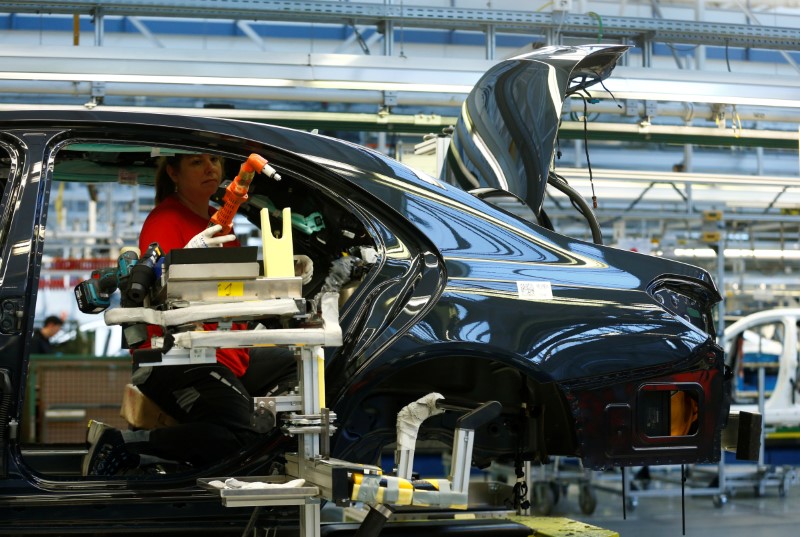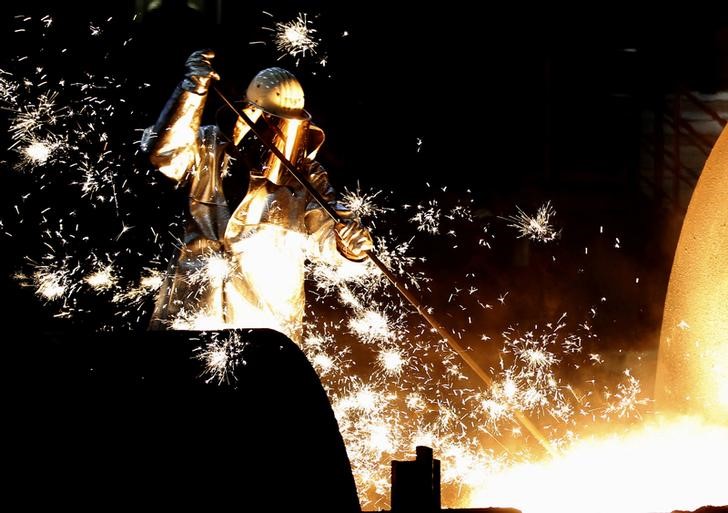By Michael Nienaber
BERLIN (Reuters) - A stronger-than-expected rebound in German industrial output in March, and a jump in exports in the same month, helped ease concerns on Tuesday that growth in Europe's biggest economy could have come to a standstill at the start of the year.
The Federal Statistics Office said industrial production rose 1.0 percent on the month, the strongest increase since November and above expectations of a 0.8 percent rise.
Seasonally adjusted exports were up 1.7 percent while imports fell 0.9 percent, widening Germany's disputed trade surplus to 22 billion euros ($26.20 billion) in March, it said.
U.S. President Donald Trump has repeatedly criticized Germany's export strength, arguing that U.S. import tariffs would protect American manufacturing jobs and reduce the U.S. trade deficit with Germany and other EU countries.
The bullish output and export figures brought some relief after weak data for January and February pointed to a massive slowdown in the first quarter.
"Rebounding exports and industrial production show that talk of a downswing has been premature," ING Bank economist Carsten Brzeski said.
But given the first two disappointing months, overall gross domestic product (GDP) growth in the first quarter, due next week, is likely to come in weaker than the 0.6 percent registered in the final three months of 2017.
Unicredit (MI:CRDI) economist Andreas Rees said the data pointed to a quarterly growth rate of up to 0.4 percent. "Maybe this is just a blip in the first quarter, but this weaker performance could also continue in spring," Rees added.
The outlook for German exporters has clouded as factories face headwinds from rising protectionism and a stronger euro. This was also reflected in data on Monday which showed industrial orders dropped for a third month running in March due to weak foreign demand.
A string of unexpectedly weak economic data had pointed to a cooling in the euro zone economy as a whole, possibly making it more difficult for the European Central Bank to begin scaling back in its unprecedented monetary stimulus later this year.
CALM PHASE
In the first quarter as a whole, German industrial production edged up 0.1 percent on the quarter, the economy ministry said.
"After the strong performance in the course of 2017, production in manufacturing took a breather in the first quarter," the ministry said.
The ministry blamed the weak start to the year on a flu epidemic, an unusually high number of strikes and an above-average number of holidays over Easter falling in March.
"After a calm phase, industrial output will gain momentum in the course of the year," the ministry said, pointing to full order books and favorable economic conditions for trade.
The DIW economic institute has said it expected economic growth to slow down to 0.4 percent in the first quarter and bounce back to around 0.7 percent in the second.
ING's Brzeski agreed there was little reason to doubt the underlying strength of Germany's current upswing, which is now in its ninth year.
The biggest domestic problem for the German economy is that factories are struggling to further boost production, he said, pointing to record employment and widespread labor shortages as well as filled order books and capacity constraints.
"Against this background, more investment seems to be the best and easiest way forward. It would increase production capacity and could lift the current speed limits," he added.

